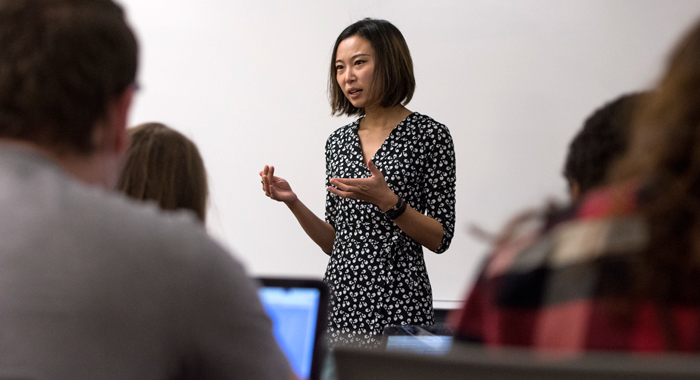Women’s Paths to Political Leadership Draw Research Interest
Young-Im Lee (Political Science) traces her scholarly interests to the changes made in the South Korean political and electoral system in 2004. Her native country moved from a one-ballot system (where citizens select the local candidate they prefer) to a two-ballot system (where citizens select both the local candidate they prefer and the political party they prefer to lead the country).
More importantly to Lee, it was about that time that gender quotas were introduced into national politics. In 2000, a 30-percent candidate gender quota for proportional representation seats was recommended to political parties and, four years later, the law was changed to mandate a 50-percent gender quota for proportional representation seats.
“It was a major shift and the number of women in the South Korea legislature increased, showing how powerful gender quotas can be,” says Lee, whose research focuses on the role gender quotas play in legislative elections and the different paths women take to national leadership positions primarily in South Korea and other Southeast Asian countries.
South Korea is far from alone in its use of gender quotas. Today, 118 countries around the world use gender quotas in politics – a fact that surprises many Americans. “It’s very surprising here, but most of the world has them in place,” Lee says.
The changes to South Korea’s electoral system and the introduction of gender quotas sparked Lee’s research into the role that gender plays in legislative and presidential politics in her home country. Park Geun-Hye would become South Korea’s first female president in 2012 – although Lee, a Ph.D. candidate at the University of Missouri-St. Louis, believes Geun-Hye’s ascent was more closely tied to her family connections than her gender. (Geun-Hye’s father was president from 1963 to 1979 and her mother was a popular first lady who was assassinated in 1974.)
“It is fascinating that three countries with strong patriarchal cultures – the Philippines, Indonesia and Myanmar, the country formerly known as Burma – all have had either female presidents or a strong political leader,” says Lee, referencing Nobel laureate Aung San Suu Kyi of Myanmar. “I wanted to find out how that, in countries, where women do not have a high standing, that they have had women leaders.”
But to get to that point, Lee first had to understand the role that women played in the legislative branch, and how they got there. She conducted interviews and reviewed data from elections around the world and discovered “gender quotas are not a silver bullet to solving the question why more women are not in political leadership roles.”
Lee suggests there are many factors at play, including an ambition gap between women and men, and perceptions of women by other politicians. During her research, Lee interviewed many female South Korean legislators and their staff members. “When I talked to many of these women, they felt like second-class citizens,” she says. “They do not have much political power, and limited access to party leadership.”
Lee adds that to “make” the gender quota a political party may run a woman in an area where it knows she would lose – perhaps the American equivalent of the Democrat experience in a historically red state like Utah or Montana.
“These women lose and the parties say, ‘we tried,’ but really they did not,” says Lee. Lee – a visiting professor at St. Norbert – has made several presentations about her research while studying in the United States, but has not published a final version yet. When it comes to leadership positions in politics, quota systems tend to not be good for minorities, whether they are gender or racially based.
While Lee’s research focuses on the role gender plays in elections in South Korea and elsewhere in Southeast Asia, she is teaching courses at St. Norbert this fall that include Introduction to American Politics, Research Methods & Techniques and Political Parties & Elections. In her teaching, Lee likes to incorporate community engagement and service learning. For example, students in Lee’s research methods class conducted a research project on the college’s efforts to promote voter registration and voter turnout led by the Norman Miller Center.
“It was a great learning opportunity. The students designed and executed a survey of their fellow students and faculty, to look at the project’s impact and suggest ways to improve voter registration and turnout in the future,” Lee says. “When students are engaged, I feel they get more out of the learning experience.”
Dec. 6, 2016












